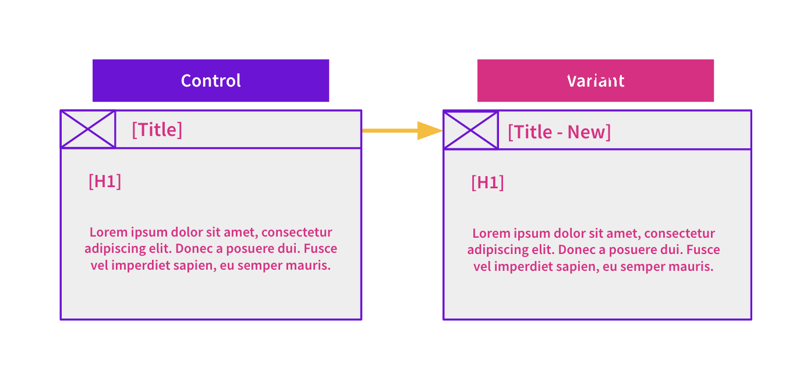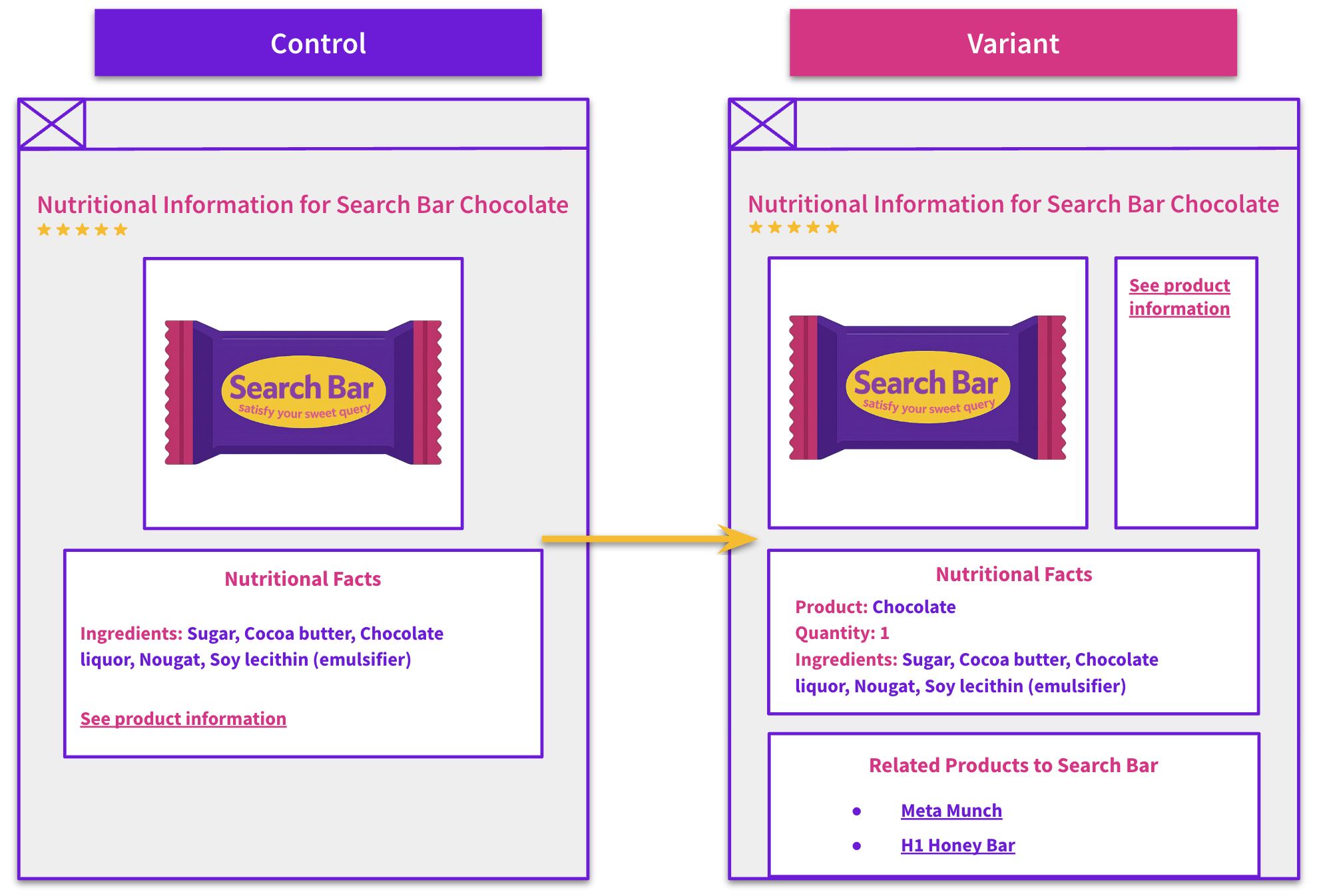Start here: how our SEO split tests work
If you aren't familiar with the fundamentals of how we run controlled SEO experiments that form the basis of all our case studies, then you might find it useful to start by reading the explanation at the end of this article before digesting the details of the case study below. If you'd like to get a new case study by email every two weeks, just enter your email address here.
Title tags are an HTML element used to specify the title of a webpage. Related to our recent case study where we discussed H1 tags and how they function as the on-page title of a webpage, title tags function as the title that appears in the search results pages. They serve as concise summaries of the content found on the page and are crucial for search engine optimization (SEO).
Title tags not only provide users with a glimpse of what the page is about but also play a significant role in determining the relevance of the page to a user's search query. Crafting compelling and relevant title tags that accurately describe the page's content can help improve click-through rates (CTRs) and rankings.
What is a Title Tag’s Impact on SEO?
Title tags carry significant weight in determining a page's rank in search engine results. Google uses title tags as one of the primary factors in determining the relevance of a page to answer a user's search query. Therefore, optimizing title tags with relevant keywords and phrases that accurately reflect the content of the page can positively impact a website's organic search visibility.
Additionally, well-optimized title tags can enhance the user experience by providing clear and informative previews of what the page contains, thereby increasing the likelihood of users clicking through to the website.
Feel free to jump ahead to the key sections below:
What is a Title Tag's Impact on SEO?
What Google says about Title Tags
What are the ways that we use Title Tags to increase organic traffic?
3 SEO A/B Test Case Studies that Show How Title Tags Impact SEO Performance
What Google says about Title Tags
According to Google's guidelines, a successful title tag should accurately describe the webpage's content and be relevant to the user's search query. Google also recommends keeping title tags concise, typically between 50-60 characters, to ensure they display properly in SERPs without being truncated.
On top of that, Google advises against stuffing title tags with excessive keywords or using irrelevant or misleading titles. This is called keyword stuffing which is the practice of excessively overloading a web page with keywords in an attempt to manipulate search engine rankings. In recent years Google has cracked down on keyword stuffing by depressing a webpage’s rankings because of the negative impact it has on user experience.
In Google's view, well-crafted title tags not only help search engines understand the content of a webpage but also assist users in determining whether the page is relevant to their query. Google encourages website owners to create unique, descriptive, and compelling title tags for each page on their site, avoiding duplicate titles across multiple pages. Google suggests including relevant keywords in title tags, especially those that accurately reflect the primary topic or theme of the page. Following Google's guidelines and best practices for title tags, you are likely to enhance your site's visibility in search results and elevate the overall user experience.
What are the ways that we use Title Tags to increase organic traffic?
A well-optimized title tag can help Google understand the content and context of a page, making it more likely to be displayed prominently in relevant search results. Consequently, crafting informative, relevant, and keyword-rich title tags is essential for improving organic search visibility and attracting targeted traffic to a website.
In addition to their influence on search engine rankings, title tags also directly impact user engagement and click-through rates. When users perform a search, the title tag is one of the first elements they see in the search results, serving as a preview of the content available on the webpage. A compelling and accurately descriptive title tag can capture the attention of users, encouraging them to click through to the website to learn more.
Conversely, if a title tag is vague, irrelevant, or fails to convey the content of the page effectively, users may overlook the search result in favor of more informative titles. This can lead to decreased CTRs and potentially lower rankings over time.
Title tags also contribute to the overall user experience by providing clear and concise information about the content of a webpage. When users encounter search results with descriptive and relevant title tags, they are more likely to find the information they need quickly and efficiently. This enhances user satisfaction and encourages repeat visits to the website, ultimately contributing to improved site authority and credibility.
Google does occasionally rewrite the title tags displayed in search results to better reflect the content of the webpage and improve user experience. This practice aims to provide users with more accurate and relevant information about the page's content, especially when the original title tag may not effectively summarize the page's topic. This also happens when it doesn't match the user's search intent making it more difficult sometimes to make impactful changes to the title tag.
Therefore, optimizing title tags to accurately reflect the content of the page and appeal to both search engines and users is essential for successful SEO efforts and achieving long-term online visibility and success.
- Be Concise: Google recommends keeping title tags between 50-60 characters to ensure they display properly in SERPs without being truncated.
- Be Descriptive and Relevant: Google advises crafting title tags that accurately describe the content of the webpage and are relevant to the user's search query.
- Avoid Keyword Stuffing: Google discourages stuffing title tags with excessive keywords or using irrelevant or misleading titles, as this can negatively impact both user experience and search engine rankings.
3 SEO A/B Test Case Studies that Show How Title Tags Impact SEO Performance
Optimizing title tags for SEO can obviously have a positive impact, but determining the necessary changes to achieve this result can be challenging, particularly since it depends on your industry. A/B testing gives you the opportunity to explore different optimization options to identify the most beneficial and implement it.
We have experimented with title tags more than any other element! Recently, we tested changing title tags visually for an e-commerce website. The goal was to increase our CTRs by capitalizing the keywords in the title tag, drawing more attention to our listings in the SERP.
This experiment showcased the impact that title tags can have on just CTRs with a positive impact on organic traffic of 8.5%. Title tags can be used to improve CTRs and rankings, so it is impressive to see that they can cause a positive impact on organic traffic when only pulling one of these levers.
We’ve also tested multiple iterations of adjusting title tags to try and better align with users’ search queries. In a recent case, we tested adding a question about cost to the title tags on a customer’s offer pages. The goal was to closely align our title tags with the search queries of our users who we had noticed were coming to the site with queries like “How much does [product] cost?” This resulted in another positive impact on organic traffic with a 5% uplift illustrating the power of combining keyword insights with title tag updates.
Even a title tag change as small as one or two words can prove to have a positive impact on organic traffic. In this example, we tested adding ‘the best’ to the beginning of an editorial customer's title tags in another attempt to better match our title tags to users’ search queries. This test also shows the influence title tags have on both CTRs and rankings to achieve a positive impact on organic traffic. In this case, we saw an increase of 10% proving that even the smallest change can have a significant impact!
How our SEO split tests work
The most important thing to know is that our case studies are based on controlled experiments with control and variant pages:
- By detecting changes in performance of the variant pages compared to the control, we know that the measured effect was not caused by seasonality, sitewide changes, Google algorithm updates, competitor changes, or any other external impact.
- The statistical analysis compares the actual outcome to a forecast, and comes with a confidence interval so we know how certain we are the effect is real.
- We measure the impact on organic traffic in order to capture changes to rankings and/or changes to clickthrough rate (more here).
Read more about how SEO A/B testing works or get a demo of the SearchPilot platform.


